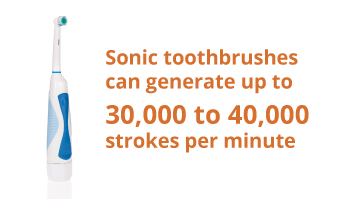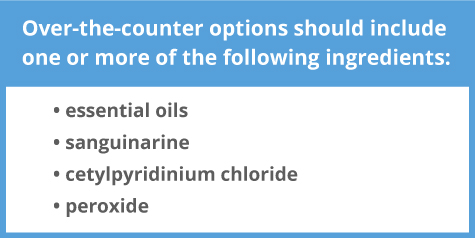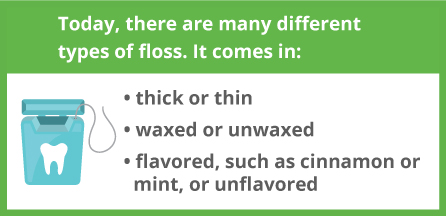Walking into the oral-care aisle at your local grocery or drug store can feel overwhelming. The shelves are crammed with hundreds of different brands of toothpaste, mouthwash, and dental floss, not to mention the rows and rows of different toothbrushes.
You may find yourself wondering, “What’s the best mouthwash? What’s the best toothpaste for kids? Should I get an electronic toothbrush? Just how many dental floss types are there?”
We understand your confusion, and we’re here to help. At our dental offices outside Phoenix, we often get questions from patients worried that they’re buying the wrong oral-hygiene products or brands.
Read on for a buyer’s guide to oral-care items. This knowledge will help you navigate the toothbrush aisle with confidence. We’ll break down the best products overall, as well as more specialized items, such as:
We’ll also look at which brands deliver the best value.
Let’s begin with a look at toothbrushes.
The toothbrush has been around for thousands of years. Back in 3500 B.C., Babylonians and Egyptians made the first crude ones with twigs, fraying the edges to use to clean their mouths. By 1780, toothbrushes with bristles taken from swine were being sold in England, and in 1938, with the invention of nylon, the modern-day toothbrush emerged.
There are thousands of toothbrushes on the market today. The most important thing to remember about toothbrushes is this: Buy one with soft bristles. Save the hard, tough bristles for cleaning the grout in your bathroom. Teeth and gums are delicate, and they should be treated as such by your cleaning devices. If you saw away at your teeth with a heavy hand and a hard bristle, you can erode the gums and remove the tooth enamel that protects your teeth.
In fact, if you need a further refresher on the best way to brush before you buy a new toothbrush, take a look at our guide for brushing and flossing.
There are dozens of different types of toothbrushes, each with various features.
| What to consider when buying a toothbrush: |
|---|
| Grip style: straight, contoured, angled, or curved |
| Handle length: long or short |
| Head shape: rounded, oblong, oval, or rectangular |
| Head size: large or small |
These variables are all based on personal preference. If you have a small mouth or you are buying a child’s toothbrush, you should find a head smaller than the average of 1 inch tall, 0.5 inches wide. In fact, some adults with small mouths or receding gums who need a gentle cleanse will opt for a child’s toothbrush rather than an adult’s.
There is no one brand that will work best for every person. Much of picking the right toothbrush depends on your mouth and your needs.
That said, here are a few tips to help you determine which brush is right for you:
Now we’ll tackle one of the biggest questions in the toothbrush aisle.
The electric toothbrush vs. manual debate has raged since the first electric brush hit the market in 1939. Since then, many people have equated electric with better, though that is not always the case.
| Here are three benefits of electric toothbrushes: |
|---|
| They can be more effective than manual toothbrushes. While most studies rank electric and manual about the same in terms of ability to clean, a rotation-oscillation toothbrush has performed the best. |
| They are great for people with limited mobility. If you have arthritis, for example, you may find it easier to move an electronic toothbrush around your mouth rather than try to scrub with a manual brush. |
| They make you brush longer. Most people don’t brush for the recommended two minutes with a manual brush, but with an electronic brush you often have an attached timer that encourages you to keep brushing. |
Ultimately the decision to use a manual or electric toothbrush comes down to money. Do you want to spend a lot more for an electric brush? It can cost $50 to $200, depending on the brand.
That represents a big investment for many patients we see in our Glendale, AZ, office, so you should do your homework ahead of time to find the best price, value, and efficiency. We recommend one with an ADA seal of approval. Check for a return policy in case it has any problems. Look on Amazon, Target, and other retail sites to see reviews of different electric toothbrushes. The best electric toothbrush will also have a warranty.
The most popular brands are:
A word of caution: Don’t mistake a waterpik for an electric toothbrush. They are different and not interchangeable.

We also have a lot of patients ask us the difference between the sonic vs. electric toothbrush. Sonic is a high-powered form of electronic toothbrush. It has an extremely fast vibration that can generate 30,000 to 40,000 strokes per minute.
Many brands that produce sonic toothbrushes claim they are superior to not only manual toothbrushes, but to electronic toothbrushes as well. The truth is there’s little science behind that claim. You may be able to reach parts of the mouth with a sonic brush that you can’t with other types of toothbrushes, but otherwise the cleansing is pretty equal no matter what you choose.
A good toothbrush needs good toothpaste to be effective. Toothpaste dates back to 5000 B.C., or 1,500 years before toothbrushes made their first appearance. The ancient Egyptians used to rub a paste on their teeth to clean them. This later evolved into powders that were sprinkled on toothbrushes. In the 1890s, the first tubes of toothpaste began to be produced in the United States.
Today there are many toothpaste types. Toothpaste is a very personal choice. While many people think there’s one best toothpaste suited to everyone, it really depends on your dental-care needs. Read on to determine the best type for you and your family’s teeth.
Babies need their gums wiped down even before they have teeth, and it’s important to start them brushing early to develop good oral-hygiene habits. Weleda Children’s tooth gel is safe for kids to swallow and made from organic ingredients.
You will want a training toothpaste that is free of fluoride. Toddlers often ingest toothpaste, and ingesting too much fluoride can lead to staining of the teeth. The Honest Company paste, which is made without dyes, and Earth’s Best Toddler Toothpaste, which has calcium lactate, are both free of fluoride.
Once your child has stopped ingesting toothpaste when brushing teeth, you can start him or her on toothpaste with fluoride. Tom’s of Maine makes a great natural kids’ toothpaste in flavors children like.
Natural toothpastes are generally defined as those free of:
The best natural toothpaste is usually free of fluoride as well. Earthpaste, which comes in several mint flavors, and OraWellness Brushing blend, which is organic, are two popular choices.
Up to half the U.S. population suffers tooth sensitivity. Get a desensitizing toothpaste that includes potassium nitrate or stannous fluoride, such as Sensodyne.
Mouthwash is an important part of a good oral-hygiene routine, and not just because it can make your breath smell better. That’s actually of secondary concern to your dentist.
Mouthwash is very effective at removing plaque and particles of food that often get stuck in your teeth. It can also help strengthen your tooth enamel, if you use a brand with fluoride. Mouthwash can also head off future cavities by keeping your mouth cleaner.
Many patients at our practice near Phoenix ask: What’s the best mouthwash? The answer depends on what you are looking for. Overall, Listerine is a solid choice. It has the longest research base of any mouthwash, going back decades.
With that said, just about any mouthwash can effectively freshen your breath and prevent plaque buildup. You may have special needs, however, that inform your shopping.
Here’s a breakdown of the best mouthwashes for a number of different scenarios.
ACT has extra fluoride added, which helps to strengthen your teeth with each rinse.
We’re partial to Listerine, but any mouthwashes with extra fluoride are also good. This is because when they strengthen your teeth, they also hold off cavities.
Mouthwash is not a cure for periodontal disease but it can be part of a treatment program. Two good over-the-counter options are Jason’s Healthy Mouth, sold on Amazon and in health-food stores, and PerioMed, an alcohol-free mouthwash that contains fluoride.
Again, Listerine is an option because it is so effective at reducing the plaque that helps cause periodontal disease.
An antiseptic mouthwash prohibits the growth of bacteria in the future and is a great weapon against tooth decay. However, some find these mouthwashes irritating because they usually include alcohol, which can dry out your mouth. Scope and Listerine both make effective antiseptic mouthwashes.

Periodontal-disease mouthwashes have antibacterial properties. You can get prescription mouthwashes with chlorhexidine, but they are not recommended for people with caps or crowns on their teeth.
For those looking to mask the smell of tobacco on their breath, there are mouthwashes aimed at cigarette, cigar, and pipe smokers. Targon was long a favorite for this, but it has been discontinued, so Pearl Drops Smokers Mouthwash and SmartMouth have become the preferred brands.
For those trying to quit smoking, cinnamon-flavored mouthwashes can help manage cravings.
The aforementioned Jason’s Healthy Mouth is very popular and uses natural scents such as clove and cinnamon. Tom’s of Maine also makes an alcohol-free mouthwash. Of course, many concerned about artificial ingredients and chemicals prefer to make their own mouthwash rather than buying it at the store.
Any mouthwash that contains fluoride will be best-suited for those with braces, because plaque tends to build up around the brackets. ACT is an option, and Colgate has a fluoride-enhanced Flourigard mouthwash.
This is a trick category. You may have seen bleaching mouthwashes that claim to whiten your teeth, but skip the extra expense. These do not work and are not worth the money.
 Floss
FlossPeople have been cleaning in between their teeth for centuries, but dental floss did not come along until the 19th century, when a dentist in New Orleans offered silk threads to his patients to use in between their teeth. In the late 1800s, a number of companies began producing commercial dental floss, and by the 1940s, with the advent of nylon, it had become a popular product.
Our advice: Use whatever type appeals to you most, but make sure you are using it regularly. Flossing takes a little more time than brushing or rinsing, so a lot of people skip this important oral-care step.
Some prefer floss picks, which are small, plastic picks with a piece of floss stretched across, designed for one-time use. These may cost up to four times more than regular floss per use, but a lot of people find the picks easier to maneuver. If you are more likely to floss with picks than traditional dental-floss tape, then the extra expense is worth it.
Many patients ask us if they can skip flossing if they use a waterpik, a device that shoots water between the teeth to get them clean. While manufacturers claim waterpiks are more effective than flossing, the truth is they are not a sufficient substitute. If you use a waterpik, you still need to floss in order to get out the detritus that builds up between teeth each day.
A lot of patients at our office near Glendale, AZ, ask us to compare different brands. They’ll ask about Listerine vs. Scope, Crest vs. Colgate, or Oral-B vs. Colgate, etc. Do we recommend one over another? What is the best toothpaste or mouthwash?
Our answer is this: It’s largely dependent on personal preference.
There are some people who love Scope but find Listerine too medicine-y. There are others who swear by Colgate or Crest toothpaste and will never switch. That is all fine. The most important thing is you are brushing and flossing and rinsing, not that you choose a particular brand to do it with.
Perhaps you are still wondering about the best type of toothbrush for kids or the benefits of different types of toothpaste. We can help answer those questions. If you live in the Phoenix area, contact AZ Family Dental to learn more about our dental services and answer any questions you might have about oral health care.